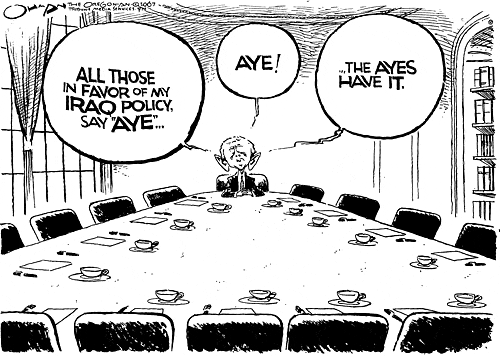Saturday, May 19, 2007
Daily Star: 'Largely irrelevant:' Study says Iraqi government near 'collapse'

| 'Largely irrelevant:' Study says Iraqi government near 'collapse' Compiled by Daily Star staff Friday, May 18, 2007 Iraq's government has lost control of vast areas to powerful local factions and the country is on the verge of collapse and fragmentation, a leading British think tank said on Thursday. Chatham House also said there was not one civil war in Iraq, but "several civil wars" between rival communities, and accused Iraq's main neighbors - Iran, Saudi Arabia and Turkey - of having reasons "for seeing the instability there continue." The report was starkly at odds with an assessment delivered by Washington's top official in Iraq on Thursday saying that the country had stepped back from "the edge of the abyss." US Ambassador Ryan Crocker said that sectarian violence in the country was not as widespread as it was a year ago but conceded that patience with continued violence was not "limitless." "If I had to evaluate today, and looking purely at the security situation, as devastating as the Al-Qaeda-led chain of suicide vehicle attacks is, that does not in my mind suggest the failing of the state or of society," Crocker told reporters. Crocker seemed to be responding directly to language in the Chatham House report, which saw potential for the "collapse" of Iraq. "It can be argued that Iraq is on the verge of being a failed state which faces the distinct possibility of collapse and fragmentation," the group's report said. "The Iraqi government is not able to exert authority evenly or effectively over the country. Across huge swathes of territory, it is largely irrelevant in terms of ordering social, economic and political life." The report also said that a US-backed security crackdown in Baghdad launched in February has failed to reduce overall violence across the country, as insurgent groups have just shifted the focus of their activities outside the capital. While cautioning that Iraq might not ultimately exist as a united entity, the 12-page report said a draft law to distribute Iraq's oil wealth equitably among Sunni Arabs, Shiites and ethnic Kurds was "the key to ensuring Iraq's survival." "It will be oil revenue that keeps the state together rather than any attempt to build a coherent national project in the short term," the influential think tank said. The author of the report, Gareth Stansfield, said instability in Iraq was "not necessarily contrary to the interests" of Iran, Saudi Arabia and Turkey. "[Iraq] is now a theater in which Iran can 'fight' the US without doing so openly," Stansfield said. Crocker said that progress was being made on the three key milestones Washington has set Baghdad's leaders: the revenue-sharing oil law, legislation to allow former members of Saddam Hussein's Baath Party to take up public posts and constitutional reform. "If this were September I think it would be a terrible mistake to conclude that, because they've been able to mount these attacks, that therefore it isn't working, it isn't going to work and we just all need to pull stakes," Crocker said. "Sometimes it can be the case that you've got to look over the edge to see how deep the abyss really is," he added. Mortar rounds hit a US Air Force base north of Baghdad on Thursday, destroying one helicopter and damaging nine others, police said. The attack at Taji, a major base on the northern outskirts of Baghdad, occurred about 2 a.m., the police said. An explosion also rocked the Green Zone on Thursday in the third attack in three days on the heavily fortified area in the capital. A massive search for three US soldiers feared captured by Al-Qaeda entered its sixth day Thursday. About 4,000 US troops and 2,000 Iraqis are searching for the three US soldiers feared captured by Al-Qaeda during the ambush, which also killed one Iraqi soldier. Major General Rick Lynch, commander of US troops south of Baghdad, said Wednesday that the US was offering rewards of up to 250 million dinars ($200,000) for information on the missing soldiers' whereabouts. - Reuters, AP |
Tags: Al-Qaeda, Baghdad, Baghdad, Civil War, Iran, Iraq, North, Police, Saudi Arabia, Soldier, Turkey, War, Washington |
